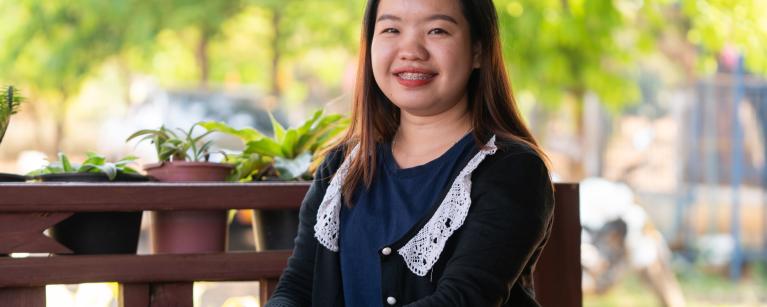SOLAR Project: Noutjaly Keovilaythong, Artfully done: Harnessing creative activities to promote gender equality and social protection in rural communities

Noutjaly Keovilaythong, Artfully done: Harnessing creative activities to promote gender equality and social protection in rural communities
It can be difficult to change people who are set in their ways, even when you are trying to do so for the best of reasons. It can be particularly challenging if you come from a different background than your audience, who might resist the overtures of an outsider. It is a good thing then that Noutjaly Keovilaythong, who conducts social protection and gender equality training in rural areas of the Lao People’s Democratic Republic, enjoys being forced out of her comfort zone.
At just 26 years of age, Noutjaly already has a wealth of experience championing social development initiatives. Though a Vientiane Capital native, she took strongly to the idea of working to assist rural Lao communities while studying at the National University of Laos after volunteering on community development projects, like those at the Participatory Development Training Centre (PADETC). After graduating in 2021, she got a job with the Phan-Thin Social Enterprise, which trains rural people on community development, media and information literacy, basic finance, and leadership and management skills – and she immediately took to the work. “Working with a non-profit organisation like Phan-Thin is more rewarding than I expected because it gives me all kinds of new experiences”, Noutjaly said. “Now I have a better understanding of how much people in remote areas need our help.”
The Phan-Thin Social Enterprise was recently selected for a grant from Oxfam under the SOLAR Project – a European Union-funded initiative implemented by the ILO and Oxfam – for promoting labour rights, social security, occupational safety and health, and gender equality in Salavan Province. Noutjaly is a technical officer on the project and travels from Vientiane to remote communities in Salavan Province every month to work with local villagers and conduct training sessions. She is also responsible for coordinating with government officials and village authorities in Salavan Province.
Motivating people in rural areas to take an interest in social security, occupational safety and health, and gender equality can be difficult because these are very new and foreign concepts to them. “It can take years, sometimes generations, to internalise these concepts and their advantages, and even longer to incorporate into their daily lives,” Noutjaly noted. In addition, due to longstanding cultural traditions in the Lao People’s Democratic Republic, especially in rural areas, a husband, uncle or another man is usually considered to be the head of a family – a belief that is rooted in social norms about traditional gender roles. It can therefore be doubly hard for a young woman like Noutjaly to engage her audiences and convince them of the benefits, as some older people and men do not like to be trained by a young woman. So, before she goes into the field, Noutjaly learns about the specific circumstances and needs of farmers in that area. She thinks about how best to respond to those needs and tailors her training content so that the farmers will be interested in her views and guidance. While social security is very important for farmers, some struggle to understand the system and few people are interested, at least initially. Noutjaly and her team try to explain the benefits in fun and interesting ways. Sometimes, they encourage the farmers to have singing competitions to make the entire training session entertaining and to work past participants’ inhibitions and barriers. Noutjaly is also persistent. When she goes to a village a second or third time, the locals usually show more interest and ask more questions.
Thanks to her and her team’s efforts, almost 200 people in Salavan Province have registered in the social security scheme so far. The patriarchal outlook in many rural communities means that Noutjaly generally finds that people are not interested in openly discussing gender equality. Undaunted, she instead uses a different approach called the Gender Action Learning System, or GALS. GALS does not aim to explain or promote concepts of gender equality, but rather engages participants in simple drawing activities. These activities prompt the participants to think about and ask questions about family situations, like who does what work on the farm and in the house every day – and how much work they do. The drawings and questions also prompt people to identify what they want in life, and to think of ways to achieve these goals.
As a result of the GALS training under the SOLAR Project, many farmer production group leaders and group members – both men and women – now share both farming and household work more equally. Noutjaly can generally be found with a smile on her face and a joke at the ready, making it easy to see how she can communicate with just about anyone on even the most difficult of topics. But even with her positive, can-do attitude she remains concerned about the current situation in the Lao People’s Democratic Republic because more and more young people are leaving the country in search of higher paying jobs abroad. “I fervently hope that young people will have greater faith in our home country,” she said, “and want to improve things by using their energies to spur development here.”